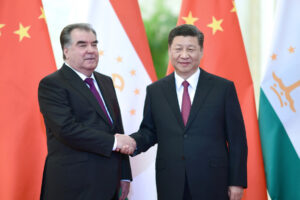According to The Paper, the U.S. military plans to deploy medium-range missiles in the Indo-Pacific region next year. Japanese media have speculated that this move is to enhance its ability to deter China. It is true that the US military has not disclosed the specific time and location, but Russian experts have warned in advance that if the US military finally takes the risk of choosing a location in Taiwan, the consequences will be serious.
In response to this plan of the US military, US think tank expert Panda believes that since US allies such as Japan and the Philippines are not willing to accept the US deployment of medium-range missiles in peacetime, the US military will most likely deploy the first batch of missiles in Guam. However, he also pointed out that if the situation becomes tense, these countries may relent. Panda predicted that the United States may find ways in the future to allow these allies to retain the possibility of allowing the US military to deploy missiles.
As for the specific purpose of this US military plan, some analysts believe that this may be related to the current insufficient combat capabilities of the US Navy in the Indo-Pacific region. The current area denial capabilities possessed by the People’s Liberation Army are of great concern to the U.S. Navy. If a conflict occurs at China’s doorstep, aside from the PLA’s navy and air force, the Rocket Force’s land-based missiles alone can have a great impact on U.S. ships. Good “deny” deterrence. The goal of these land-based medium-range missiles that the US military plans to deploy is to focus on some key ground targets of opponents, including land-based missiles. In this way, the pressure on the US Navy can be relieved to a certain extent.
But the problem is that according to information released by the United States, the Tomahawk and SM-6 missiles currently being considered by the U.S. Army have a range of within 3,000 kilometers. If the US military deploys it in Guam, its strike range will be very limited, and the actual threat it poses to China will not be as great as the threat from cruise missiles of the US navy and air force. Moreover, even if the US military is forward-deployed in allies such as Japan and the Philippines, the mobility of land-based medium-range missiles still has great limitations. Compared with the U.S. Navy and Air Force, ground targets like the U.S. Army are more likely to be hit.
In this regard, some analysts believe that the U.S. Army’s announcement of the plan at this time does not rule out the possibility of following the U.S. military’s old routine of applying for funds by exaggerating the Chinese threat. At the same time, positioning the U.S. Army at the forefront of the fight against China will also help increase their influence within the U.S. military.
Moreover, countries such as Japan and the Philippines are basically unlikely to accept military power like the United States. The reason is simple. Whoever possesses these weapons will be the priority target when a conflict breaks out. It is true that these countries have repeatedly provoked troubles at China’s doorstep in order to cooperate with the United States’ Indo-Pacific strategy. But in fact, after these confrontations, they have already had a rough understanding of the strength of the People’s Liberation Army. On the one hand, the Philippines is provoking China, and on the other hand, it is claiming that China does not want to go to war. This is actually the reason. They know that they do not have the ability to deal with the situation getting out of control.
In contrast, Russian expert Romanov believes that although it is risky, the United States may consider choosing Taiwan. The reason he gave is that the Taiwan authorities are highly dependent on U.S. military sponsorship. If the United States makes such a request, the Taiwan authorities may agree.
It is worth noting that such speculation is absolutely tenable. Not long ago, the media on the island just broke the news that the Taiwan authorities planned to purchase retired US military combat ships. For the Taiwan authorities, even decommissioned American weapons are treasures, and the appeal of more powerful medium-range missiles can be imagined.
According to the latest polls released on the island, the support of the Democratic Progressive Party’s “Lai Xiaopei” has dropped seriously, and it is currently lagging behind “Hou Kangpei”, and it is not even ruled out that the gap will widen. Often when the election situation is tight, the DPP will take the “anti-China and Taiwan” card to its extreme. In a sense, even if the Americans have not considered choosing a location in Taiwan, it is very likely that the DPP authorities will take the initiative to propose it.
However, the consequences of the United States deploying missiles in Taiwan are very serious. Romanov said that doing so is likely to trigger a comprehensive military conflict between China and the United States. Because this move by the US has seriously crossed the red line.
When talking about the Taiwan issue, our Ministry of National Defense made a solemn statement that the security of the Taiwan region can only depend on the peaceful development of cross-strait relations, rather than relying on a few American weapons. If the United States crosses the red line, the People’s Liberation Army will never show mercy.
In addition, Romanov also pointed out that even if the United States does not choose to locate in Taiwan, as long as medium-range missiles enter the Indo-Pacific, a new arms race will be intensified in the region, which will pose a huge threat to regional peace and stability. Therefore, not only China, but also America’s allies should prevent such dangerous measures. Otherwise, once the situation gets out of control, no one will be spared.
The resumption of high-level dialogue between the two militaries between China and the United States has brought relief to the entire international community. We still hope that the United States can make good use of this channel and do less things that undermine mutual trust between the two militaries.
Source : Mil Sohu
















